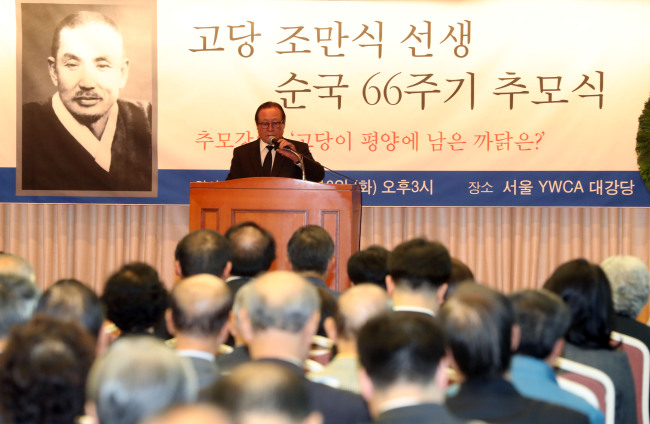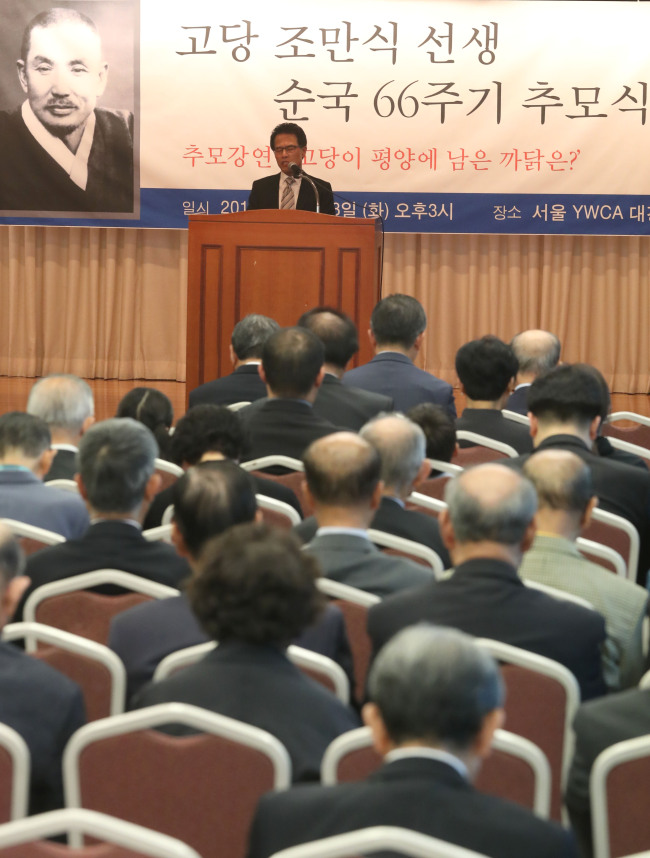Robert Park is a founding member of the nonpartisan Worldwide Coalition to Stop Genocide in North Korea, minister, musician and former prisoner of conscience. --Ed.
In a 1991 interview with the JoongAng Ilbo, North Korea‘s former ambassador to East Germany -- who defected in 1959 -- clarified the circumstances of Godang Cho Man-sik’s assassination:
“After retreating to Kanggye, North Pyeongan Province, I heard from the leadership that on the night of Oct. 18 while the People‘s Army fled from Pyongyang, approximately 500 people were shot to death at Pyongyang prison. Among the corpses, some were buried in a hastily dug hole at the Daedong riverside, including the body of Cho Man-sik. Most of the bodies were simply abandoned.” (Park Gil-yong)
In a 1991 interview with the JoongAng Ilbo, North Korea‘s former ambassador to East Germany -- who defected in 1959 -- clarified the circumstances of Godang Cho Man-sik’s assassination:
“After retreating to Kanggye, North Pyeongan Province, I heard from the leadership that on the night of Oct. 18 while the People‘s Army fled from Pyongyang, approximately 500 people were shot to death at Pyongyang prison. Among the corpses, some were buried in a hastily dug hole at the Daedong riverside, including the body of Cho Man-sik. Most of the bodies were simply abandoned.” (Park Gil-yong)

Sixty-six years have elapsed since Godang Cho Man-sik’s death. The great Korean independence activist was murdered in obscurity amidst the fog of war; nevertheless, his life and legacy continue to speak volumes to Korea‘s increasingly perilous state of affairs.
Preceding Korea’s severance, Cho Man-sik was unquestionably the most revered and established political leader within the northern region of the peninsula. Subsequent to Korea‘s partition, with the northern sphere falling under Soviet occupation and the southern zone under US control, the Soviets themselves could not escape recognizing this fact.
Initially -- as communism was broadly disfavored in the north -- Soviet authorities thought it inevitable to operate through “a coalition that would include Northern noncommunist nationalist elements” and, on account of his popularity, Cho Man-sik was their primary choice to be “nominal leader” as recounted in a 2004 work by journalist Bradley Martin. Andrei Lankov points out in “From Stalin to Kim Il Sung: The Formation of North Korea,” “Using the prestige of Cho Man-sik and other well-known nationalist leaders seemed very useful;” and affirms Cho Man-sik was the “almost certain candidate for supreme power in North Korea.”
“The Korean Gandhi”
Although a skilled fighter in his youth, Godang has oft been likened to Gandhi for his unwavering commitment to non-violence during his both principled and strategic resistance to Japanese imperialism. He was well read, is reported to be an admirer of Russian writer Leo Tolstoy (another famous proponent of non-violence) and esteemed Jesus Christ as his master.

Throughout Korea’s grievous years as a Japanese colony, Godang stood at the forefront of the formidable battle for Korean dignity and self-determination. He paved the way for the proclamation of the Declaration of Independence by the Korean Youth Independence Corps in Tokyo on Feb. 8, 1919, and played a crucial role in behind-the-scenes preparations relevant to the March First Movement, for which he was imprisoned by the Japanese colonial administration. At a later stage, he publicly contravened the colonial regime’s cruel ordinance that Koreans alter their surnames for Japanese ones.
Godang labored devotedly as a teacher and principal at the storied Osan School -- which conjointly served as a base for the independence movement -- for several years, choosing to do so without remuneration. The famous school was established in 1907 by Namgang Lee Seung-hun (1864-1930), who was among the 33 signers of the Declaration of Korean Independence proclaimed on March 1. The institution sought to instill within Korean youth a patriotic love for their heritage along with the comprehension of their true history.
Cho lived together with his students, cleaned the school himself and was wholly committed to the achievement of his pupils’ fullest potential. One of his students and co-laborers for national restoration was the renowned Pastor Joo Gi-chul (1897-1944), who withstood torture and was martyred in 1944 for preaching against and refusing to worship at Japanese Shinto shrines -- which paid homage to Japanese war criminals -- in brave defiance of the colonial regime‘s outrageous decrees.
Godang was also targeted for persecution due to his extraordinary advocacy for a self-sufficient economy, having founded a national movement for economic independence termed the Korean Products Promotion Society in 1922. The all-embracing initiative, inaugurated in Pyongyang, galvanized and convinced Koreans across the nation -- from all walks of life -- concerning the need to manufacture and patronize native foods and products. Godang embodied these principles, even avoiding Western clothes and exclusively wearing the Korean hanbok.
Not only was he wise, resilient and courageous, Godang was also genuinely humble and inspiring. People followed his lead because they wanted to, not because they had to. A 1985 essay by historian Kenneth Wells relates that Cho’s living quarters in Pyongyang were “like a peasant‘s for frugality,” as recalled by an acquaintance. He was respected even by those who disagreed with him due to his “practice of influencing the nation through personal moral example,” fusing “traditional commoner’s values with the practical elements of the Western religious and scientific outlook.”
The contrast with he who was to latterly assume the helm could not be more blatant. Unlike Kim Il-sung -- who various reports suggest rather feared Cho -- Godang was not willing to kowtow to the Soviets. According to Korean-language accounts, he confronted the crimes of Soviet soldiers, such as regarding the plundering of Korean material resources, the confiscation of provisions needed by his fellow countrymen and even charges of rape. He was staunchly unwilling to subordinate the well-being and best interests of the Korean nation and people for personal advantage or in the pursuit of power, again in direct contradistinction to Kim.
As noted by the late journalist David Halberstam, more proven Korean leaders were “underwhelmed” by Kim Il-sung’s “youth and lack of grace.” At his first public unveiling by the Soviets, Halberstam depicted the crowd‘s disappointment with Kim and his first open speech:
“It was a Russian show. Kim spoke flatly, in a monotone, in words written by the Russians, and what the crowd heard was a young, rather inarticulate politician with a ‘plain, duck-like voice.’ ... But what really bothered many in the crowd was his adulation of Stalin and the Soviet Union. ... Here they were, hoping for distinctly Korean words of freedom, and his words were reflecting a new kind of political obedience.”
Lankov adds, concerning the Oct. 14, 1945 address, “The speech contained some idioms specific to Soviet publications in Korean, but strange and even incomprehensible to most of those present.”
Ultimately, it was Godang’s repudiation of the UN “trusteeship” plan -- originally proposed by the Americans -- which led to his outright arrest. The scheme projected five years of “tutelage” by the United States, Soviet Union, Britain and the Republic of China in Korea.
When news about the framework first surfaced following the 1945 Moscow Conference, protests erupted in both northern and southern Korea for emancipation without delay. As did Cho, the majority of Koreans saw the trusteeship program -- which meant prolonging an inhumane, precarious and needless division -- as a maneuver to perpetuate the subjugation of Korea by new rulers, and felt deeply that postponing the country‘s independence any longer was irrational and unjust. Presently, in view of the unparalleled horror Korea faced over the intervening years -- including one of the most devastating wars in recorded history and arguably the gravest humanitarian crisis of our generation within the North -- we must candidly admit, the prevailing sentiment of that period for immediate autonomy together with retaining Korea’s age-old unity has proven equitable and paramount.
By Robert Park
-
Articles by Korea Herald



















![[Today’s K-pop] Treasure to publish magazine for debut anniversary](http://res.heraldm.com/phpwas/restmb_idxmake.php?idx=642&simg=/content/image/2024/07/26/20240726050551_0.jpg&u=)